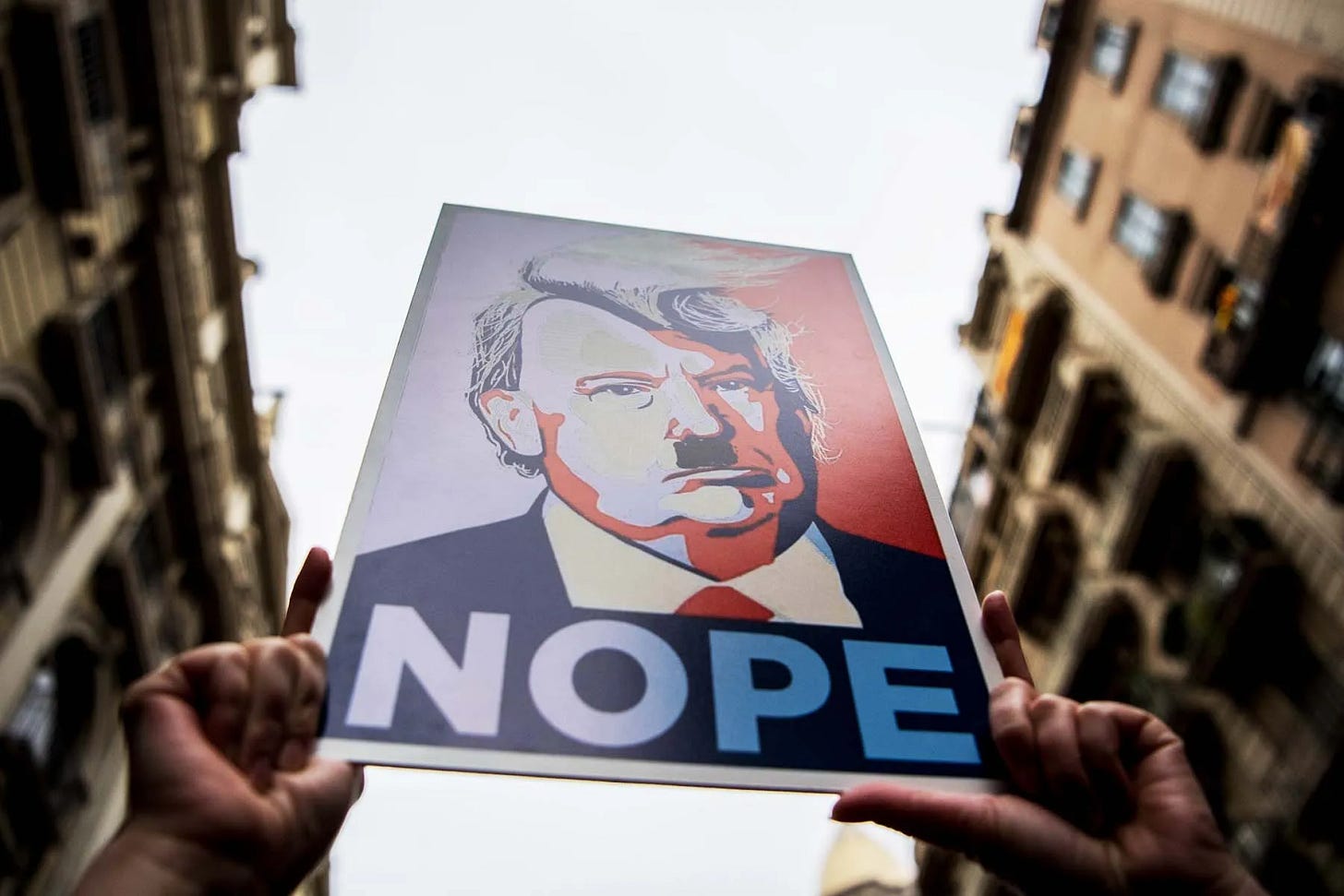First, thank you for following me and our family on this journey.
On January 28, 2025, I founded Borderless Media, LLC. That company owns this blog (and other properties I will develop) to help consolidate the information I am developing about how to live elsewhere in the world.
Let’s begin with why.
Why Leave America?
Is it Trump?
Well, I’d be lying if I said emphatically no, but I’d also be lying if I said that was the only reason. I want to say at the outset that I do not plan to renounce my citizenship to the United States of America.
Unlike most of you reading this blog, I have taken the Oath of loyalty to the United States of America and pledged to defend its Constitution, which is a lifelong requirement. I held a national security clearance (a lifelong obligation). I did so as a political appointee (again, requiring a lifelong obligation).
I take that requirement seriously. (If for no other reason, failure to abide by the national security obligation lands me in prison.)
However, I cannot help but recognize some alarming trends in the United States. If you read my other substack, The Long Memo, I talk about the implications of many of those things in detail as current events unfold.
But in a more general (and systematic way), let me briefly summarize the trends that have made me look at a “Plan B” to live abroad.
The Rule of Law in America is eroding.
Do I expect the United States to become a totalitarian state ultimately? It’s possible but unlikely. The mechanics of control in modern America are more subtle and insidious and far less reliant on crude imagery of jackboots and military parades. I’ve written elsewhere about why I don’t see martial law as a probable outcome, but that doesn’t mean we’re immune to authoritarianism.
You don’t need a police state to see a dictatorship. Totalitarianism isn’t just about violence or state force; it’s about control, about narrowing the range of acceptable thought, about shaping reality so thoroughly that people comply without realizing they’ve been coerced. The most effective authoritarian regimes don’t need to send troops into the streets or suspend elections indefinitely. They use bureaucracy, corporate influence, and legal maneuvering to make resistance feel not just dangerous but futile.
People expect tyranny to announce itself. It rarely does. When we think of totalitarianism, we think of North Korea’s brutalist oppression, China’s mass surveillance state, or the Soviet Union’s ruthless secret police. We imagine the stark visuals of Orwell’s 1984—mass purges, forced labor camps, an omnipresent, watchful Big Brother. But most modern forms of authoritarianism don’t operate that way. In fact, outright physical oppression is often a sign of failure—an admission that the population is resisting in ways that require brute force. The truly successful regimes are the ones that convince people that resistance is not just impossible but unnecessary.
This is where America’s vulnerabilities lie. It’s not that the government will declare martial law overnight or that democracy will end in a single dramatic event. It’s that, over time, the levers of control shift in ways that make traditional democratic checks and balances functionally meaningless.
I believe that process is well underway (or at best, America’s long-term trajectory is in that direction.)
How Modern Totalitarianism Operates
Control in the modern world isn’t primarily enforced through direct military occupation; it’s enforced through bureaucratic complexity, economic dependence, media consolidation, and legal entanglement. Consider the following:
Media Control Without Direct Censorship – You don’t need state-run media when a handful of corporate conglomerates own most news outlets, ensuring that only certain narratives dominate. Censorship in the traditional sense isn’t necessary when media companies voluntarily shape coverage based on government relationships, corporate partnerships, or ideological conformity. The result? A narrow spectrum of acceptable discourse, where significant issues are framed in ways that preclude actual systemic critique.
Normalization of Surveillance and Dissent Suppression – The United States has constructed one of human history's most sophisticated surveillance infrastructures. The NSA, FBI, and local law enforcement agencies all operate with near-total impunity when it comes to data collection and tracking of citizens. And yet, most Americans have accepted this reality because they’ve been told it’s a necessary trade-off for security. (I know this because, looking back, I was one of the bureaucrats who helped make it happen in the wake of 9/11.) Meanwhile, organizations that challenge government power, from whistleblowers to activists, often find themselves harassed, audited, or legally entrapped—not by a dictator’s decree but through the quiet mechanisms of national security policy and selective law enforcement.
Economic Dependence as a Tool of Compliance – Totalitarian control isn’t always about direct repression; sometimes, it’s about ensuring that the cost of dissent is too high. Consider how industries rely on government contracts, subsidies, or favorable regulations to survive. If an individual or corporation steps too far out of line, the financial consequences can be immediate. Whether it’s banks freezing accounts, corporations blacklisting individuals, or industries facing regulatory retaliation, economic precarity becomes a means of control without a single soldier having to intervene.
Legislative Overreach and the Death of Meaningful Opposition – Over time, a country's legal framework can be reshaped to erode genuine checks on power. New laws expand executive authority, weaken congressional oversight, and grant agencies near-unchecked power in the name of security or economic stability. The result? Governments don’t need to declare states of emergency or overtly suspend civil liberties—they can legislate their way into total control.
“Be Seeing You”: Control Without Coercion
The genius of modern authoritarianism is that it doesn’t feel like a dictatorship. The trappings of democracy remain intact—elections are still held, courts still operate, laws are still passed. But functionally, the people’s ability to change the system meaningfully is diminished year by year.
Elections become a contest between two parties that, while fighting over cultural issues, remain largely aligned on the key pillars of power—military expansion, corporate consolidation, and national security priorities. The courts, while appearing independent, are increasingly stacked in ways that reinforce executive power. Dissent is tolerated, but only within prescribed limits, and those who push beyond them are quietly neutralized—not with bullets, but with lawsuits, financial ruin, or digital erasure.
If we assume that tyranny only looks like a police state, we risk missing it when it takes a different shape.
America, at least for now, still has structural advantages that make outright totalitarian rule unlikely. Our federal system, independent judiciary, and deeply ingrained political culture provide some insulation. But those safeguards are eroding. The challenge isn’t whether the United States will suddenly become a dictatorship overnight—the challenge is whether, years from now, we wake up in a system where the mechanisms of control have become so entrenched that resistance feels like a fantasy.
The worst authoritarianism isn’t enforced through soldiers and guns. It’s enforced through a system that ensures compliance is the easiest, most logical choice. The question isn’t whether the United States will become a dictatorship in the way history remembers them. The question is whether we’ll recognize it if it does.
This appears to be America’s future. That’s why I think it is wise to have the option of living somewhere else. If you get it wrong, the stakes are pretty damn high.
“The optimists died in the gas chambers, and the pessimists have pools in Beverly Hills,”
Billy Wilder.
Go where you’re treated best.
I’m going to steal, for a moment, that line - “go where you’re treated best.” I first heard the idea from Andrew Henderson, the founder of a company called “The Nomad Capitalist.” I encountered Andrew on YouTube when I started looking at this idea of living elsewhere. The idea's premise, “Go where you’re treated best,” resonated.
It resonated for a couple of reasons. I was (or I guess I still am) a political scientist. In political science, the idea of the “country” we live in is a modern construction. We make a very complex social and political contract with the government. It came about 377 years ago (1648 with the Treaty of Westphalia - but that’s a story perhaps for another time.)
We all feel this “loyalty to our country.” It’s called “Nationalism.” But should we? That was the idea that Andrew planted in my head. Andrew was (rather had been) an American citizen. He wound up renouncing his citizenship (he explains his reasons why in a video.) Now, I’ll be clear: at this moment, I don’t imagine myself going into a US Embassy, calling the chargé d'affaires over, and torching my passport in front of “him” in some grand gesture of “screw you.” (By the way, that’s not how you do it. Like all things in the United States, you fill out a form and pay a tax, which is a hefty one, I might add.)
I don’t care how crazy US politics gets. I don’t see that happening. I’m never going to say never, but I don’t see it now.
But Andrew did get me thinking about what the hell is going on in America and how I plan to spend the rest of my life. Given my Italian heritage, my wife and I like to travel, I own a business, and I can work from anywhere (and have), do I need to stay in the US and constantly feel under siege?
Let me share my logic and what I started to think about.
The Myth of Birthright Loyalty and the Case for Choosing Where You Belong
There’s a myth we are told from the moment we’re old enough to understand geography: that we owe loyalty to the land where we were born. That citizenship is not a choice but a destiny. That where you happened to emerge from the womb defines not just your passport but your identity, your obligations, and your very place in the world.
But what if that’s wrong?
What if citizenship isn’t about where you were born but where you’re treated best?
The Illusion of Inherited Allegiance
"A man does not have himself killed for a half-pence a day or for a petty distinction.
You must speak to the soul in order to electrify him."
Napolean Bonaparte
Throughout history, nations have instilled a deep sense of inherited allegiance in their people. Governments survive on this idea—not by serving their citizens well, but by convincing them they must remain loyal no matter how poorly treated. The concept is simple: If you believe that nationality is like family—something you don’t choose—you are far less likely to question whether your nation deserves your loyalty in return.
It’s why people defend systems that exploit them, why they wave flags for leaders who see them as disposable, and why they remain tethered to economies that trap them in cycles of taxation, inflation, and declining freedoms. People internalize that to leave is betrayal, that to question is treason, and that seeking a better life elsewhere is somehow disloyal.
But let’s be honest—a government doesn’t love you. A government is not your family. A government is a contract. (Those of you who are social/political science students might remember your “Jean-Jacques Rousseau” and his treatise, “The Social Contract,” which is about the nature and purpose of government.) At the core of contract law is a simple premise - pacta sunt servanda (agreements must be kept). On the “flip side” of that premise (the reason why contracts must be honored), is that contracts exist to benefit the parties that made them. If they don’t, they are meant to be renegotiated or ended when they no longer serve both parties.
The Rise of the Sovereign Individual
For most of human history, people were serfs, tied to the land, toiling under lords and kings. Mobility was restricted, not because people lacked the desire to leave but because power structures ensured they had no choice. Today, most people are still trapped in a modern form of serfdom—not by feudal chains but by paperwork, taxation, and legal structures designed to make leaving feel impossible.
But that’s changing. The rise of digital nomad visas, global investment programs, and alternative citizenships has begun to redefine what it means to belong to a country. The “sovereign individual” concept is no longer hypothetical—it is an emerging reality.
Workers can now earn remotely and live in jurisdictions that tax them less and treat them better.
Entrepreneurs can move to countries that respect their businesses instead of strangling them with bureaucracy.
Families can seek safety and quality of life in places that provide it rather than remaining in broken systems out of nostalgia.
Loyalty should be earned, not coerced. If a nation overtaxes you, undervalues you, limits your opportunities, or restricts your freedoms, then why should you stay? Because of an accident of birth? Because someone drew a line on a map generations ago and said, “This is your home?”
The Fear That Keeps People Stuck
Of course, some people resist this idea—not because they love their country, but because they fear what leaving represents. To walk away from your birthplace is to admit that perhaps the stories you were told about it weren’t true. That maybe the government isn’t looking out for you. Maybe patriotism was a tool to keep you compliant.
And yet, for those who do leap, the realization is profound: you are not trapped. You never were. The world is vast, and options exist. The only thing standing between you and a better life is the belief that you must stay in the place where you were born.
Redefining Citizenship
What if citizenship wasn’t about borders at all? What if it was simply a contract between individuals and the places that serve them best? Some countries already recognize this. Nations like Portugal, Panama, and Singapore actively court new residents and businesses. They see citizens not as burdens but as assets. They compete for them, offering tax incentives, easier immigration paths, and economic opportunities.
Compare that to places that treat citizens as cash cows—taxing them wherever they go, restricting their freedoms, and demanding compliance without accountability. If citizenship is merely a contract, why not renegotiate for better terms?
The Future Belongs to the Free
In the past, people lived and died within the borders where they were born. Today, those borders are more fluid than ever. Governments will tell you that leaving is betrayal, but the only betrayal is staying in a system that no longer serves you.
Loyalty should not be to a flag or a government but to yourself, your values, and your future. The world is too big, open, and full of opportunity to let geography dictate your destiny.
Your home is not where you were born.
Your home is where you are treated best.
That’s what I have come to understand.
That’s why I decided to start exploring.










My wife and I started the task you speak of in 2021 by applying under Portugal’s Golden Visa program when it was still possible to qualify by investing in residential property. It’s been over 2-1/2 years since we purchased the property and submitted our application and we just recently attended our biometrics appointment which is a big milestone on the path to gaining temporary residency status. We are very much invested in a blue state with family ties there and like you, not willing to renounce US citizenship. However, the democratic backsliding is intense and I’m not going to operate under the thumb of these cretins. Portugal has always been a wonderful country to us and given that the citizenry there performed a bloodless military coup to overthrow a fascist regime as recently as 1974, it’s a vibrant new democracy which has really come along way with economic development in the past 20 years. Whether I live there full-time remains to be seen, but I very much desire to be a citizen of this country that the rest of Europe pretends doesn’t even exist except for holidays and futebol.